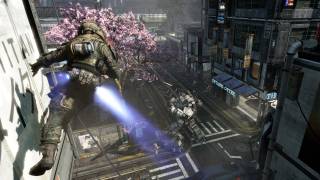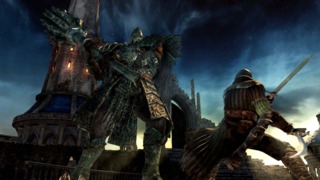Monthly Roundup, March 2014
By majormitch 2 Comments
March’s annual onslaught might have been as strong as ever in 2014, and I did my best to keep up. After wrapping up my time with Bravely Default, I spent most of March bouncing back and forth between Titanfall and Dark Souls II; I talk about all three of those below. I also spent a little time with both Hearthstone: Heroes of Warcraft and Threes!, which are a pair of fun, light games that are easy to pick up and play for cheap, but neither grabbed me enough to warrant any serious dedication. There’s plenty to talk about though, so let’s dive in!
Bravely Default

I talked quite a bit about Bravely Default last month, but wanted to add a few final thoughts now that I’m done with the game. I’m especially keen to give an update on this particular game, because my appreciation of it took a sharp turn after Chapter 4. Most of what I previously wrote remains true: I still like the game’s job system and combat overall, and I still don’t care for its story or characters. The big change comes in the pacing and structure of the game. At the risk of mild spoilers, by the end of Chapter 4 you’ve been everywhere in the game’s world, and have acquired most of the jobs (and even most of the spells and equipment). The remaining chapters concoct story reasons for you to retread the world multiple times over, and the real kicker is that you end up fighting the exact same bosses each time as well (albeit with stronger stats). Even the story beats are parallel in a Groundhog Day sort of way. I don’t think that’s necessarily the worst idea in the world, and maybe it could be done well, but Bravely Default is not the game to do it. Chapters 1-4 took me almost 40 hours of play already, and by that point I felt like I had gotten ample fill of the job and battle systems. The game was starting to bog down as it was, and I was ready for it to wrap up, especially given that I wasn’t really into the story or the characters. To then take that gameplay and stretch it out further without any new or meaningful additions, all explained by a story that continually goes further and further off the rails, is pretty ridiculous. It’s very blatant filler in my eyes, and I think it’s pretty disrespectful of the player’s time.
Given that, once I discovered what was happening in Chapter 5 onwards, I had no desire to play any more Bravely Default, and put the game down for good. The only thing I feel like I missed by not finishing it is a real sense of closure for the story, but after reading ahead and spoiling it for myself I don’t think I’m really missing anything. It’s all a shame, and makes Bravely Default a weird game to judge. On the one hand, the first four chapters form a solid, well paced adventure with a robust job system and combat that I genuinely enjoyed. On the other hand, it was already starting to bog down near the end of Chapter 4, and the stunt they pulled after that made me not want to play the game anymore. It’s an uncomfortable dynamic that leaves me more confused than anything, and I honestly don’t even know how much I like the game overall. I think it would have made a wonderful (and already lengthy) game if it wrapped up after four chapters, but the bloated final product is not something I want to even finish. Take that however you will, but I’ve decided to move on from Bravely Default.
Titanfall
There was a period of time where I played Call of Duty pretty heavily (which itself was more of a social thing), but I’ve by and large never been that into multiplayer shooters. I’ve dabbled with various Halos, Battlefields, Gears of Wars and others here and there, and while I’ve generally had fun with their multiplayer in spurts, they’ve never been something I’ve wanted to spend a ton of time with. Titanfall, then, being a multiplayer only FPS, from the guys what made Call of Duty no less, shouldn’t have been something I was interested in. I don’t even care about mechs to be honest, but something about Titanfall looked so… smooth. Despite being a little worried about how my nearly four year old PC would handle the game, I decided to give it a shot, and I’m glad I did. Right out of the gate I was impressed with how well it ran on my machine, and how well the servers held up from day one. I don't know if I’m just lucky, but I’ve had no technical or server issues with Titanfall, and it’s nice to play an online game that simply works as intended right out of the gate.

As for the game itself? It’s smooth. The thing that drew me to Titanfall initially remains my favorite thing about it, and that’s the player movement. Moving around the game’s well designed maps is consistently fun and exciting, as you can chain multiple jumps and wall-runs together in seemingly endless succession. It’s almost like someone figured out how to put Prince of Persia style platforming into a FPS, and it feels better than it has any right to. It’s also easily the standout feature to me in what’s otherwise a pretty typical FPS. That’s not to say Titanfall doesn’t execute those standards very well, but it does play it by the book pretty often. Past the movement, the two other notable changes/additions in my mind are the titans themselves, and the AI grunts that populate every game. The titular titans act kind of like potentially powerful killstreaks that everyone gets in roughly equal measure, which I think lends the game a better balance while also giving everyone something powerful to play with. They’re also fun to control, and being able to customize titan loadouts separately from the pilots makes for some interesting, if not terribly expansive options. I still think I prefer playing as a pilot purely for the movement, but getting in a titan a few times a match has its own thrills. The titans also seem to have this effect of creating hot spots that draw in the action. When a titan drops, people seem to naturally move towards them, making it always easy to find the party. The AI grunts supplement this by giving you something to shoot nearly everywhere you go, and between them I almost never find myself without a target. I was initially worried that the grunts would break the game, but they work surprisingly well. They not only make sure you always have something to shoot, but they incorporate into the scoring in a way that makes sense, and along with the way they reduce your titan’s countdown timer there’s a real incentive to shoot as many of them as possible. They can potentially be interesting game-changers, but not to the point where you can ignore enemy players either. It’s a fine line, but I think Titanfall walks it very well.
Yet in the end, it all comes back to how smooth the game is for me compared to other shooters. There’s no legitimate campaign, there’s not a ton of modes and options, and the overall experience isn’t drastically different than what the genre has been doing for years, if not decades. Given that, there’s nothing fundamental here that’s going to grab anyone who already shuns multiplayer shooters. At the same time, if I’m going to play a multiplayer shooter, it’s going to be Titanfall for the foreseeable future. It has the things I want, and does them with the appropriate amount of flair and execution to make it stand out. I’ve put a decent chunk of time into it already, and suspect I’ll continue to periodically play it for some time. It’s no revolution, but it’s a whole lot of fun. And smooth.
Dark Souls II
March’s other big game for me, released on the same day as Titanfall, was Dark Souls II. Given how much I loved both Demon’s Souls and Dark Souls, this sequel was one of the games I was most looking forward to in 2014. I managed to plow all the way through it during the month, and boy, it did not disappoint. Dark Souls II does everything I’ve appreciated about this series from the start as well as ever (much of which I’ve talked about plenty on this site already). It offers a big, expansive world to explore, one that holds countless dangers and secrets. It puts on thick atmosphere that makes it easy to get absorbed in every little detail. It boasts strong, hard-hitting combat that feels right, and offers incredibly robust character building options. It remains a deep, challenging RPG that demands every ounce of investment from the player, yet also duly respects both the player’s time and intelligence. In the ways that matter most, Dark Souls II is every bit as good as its predecessors for all the same reasons, and anyone who liked those games will almost surely like this too.
As for the differences, there are a handful of subtle ones that don’t affect the experience too greatly overall, but they will be noticeable to returning players. First and foremost, the world design harbors some sort of middle ground between Demon’s central hub world and Dark’s somewhat open world. There is a hub town that you constantly go back to, with many long paths fanning out in all directions, but those paths rarely cross with each other. It feels more open than Demon’s almost “level select” style, but the world isn’t nearly as interconnected as Dark’s is. While I think many of the individual areas are incredibly well designed (in fact, I think some of them are as good as any in the series), I do prefer the previous game’s larger design, as it made the world feel more intricate and whole. Another minor quibble is the way you’re required to return to the hub and talk to the “Emerald Maiden” every time you want to level up (similar to Demon’s). I miss being able to level up at any bonfire, as going through loading screens and listening to her monologue just to level feels completely unnecessary. Another notable difference is the way enemies don’t respawn indefinitely. Initially that sounded like a mixed blessing; if you died enough times on a boss then the run back would eventually become hassle-free, but that also means there are potentially less soul acquiring opportunities. It all turned out to be a non-issue for me, however, as I only had enemies stop spawning on two separate occasions (including one from failing to kill a damn lizard too many times). But even had it happened more often, I feel like the number of souls required for leveling has been substantially reduced such that you simply don’t need as many souls in Dark Souls II as you did before. I leveled up super fast, and hit the soft caps on my most important stats before the halfway point of the game.

Finally, while I think the difficulty in these games is generally overblown, I do find Dark Souls II to be the easiest of the series so far, if only slightly. It’s hard to say exactly how much of that is due to my overall experience with the series at this point (it would be interesting to see what newcomers think), but I still think there are a few things about the game that just plain make it easier. First and foremost, while Dark Souls II has a lot of bosses, I found a lot of them to be pretty straightforward and unthreatening. Many of the bosses are beatable by merely circle-strafing and counter-attacking after they attack; their patterns are simple and easy to read, and a fair number of them don’t even deal much damage (and I was no tank mind you). That said, there are a few optional bosses later in the game that can test your mettle. Between those and the new game+ options (which seem to more meaningfully increase difficulty than before), there’s a stiffer challenge here for those who want it, it’s just not on the critical path. I also think, with a few exceptions, that bonfires are placed more closely together than before, reducing how long you have to survive without a respite. In addition, the combination of estus flasks and consumable healing items makes it easier to remain fully healed, and the way leveling has been sped up means that your character can become much more powerful much sooner. It’s a handful of relatively minor tweaks that add up, and for the most part I don’t mind them one way or another. A lot of it feels like streamlining that just happens to make the game a little easier (as well as easier to understand and get into), but I personally would have liked a few more of the bosses to be a little tougher and more memorable if nothing else.
That’s not to say Dark Souls II is a walk in the park; if you’re careless, you still get punished fast and hard. This is Dark Souls after all, which is how I would qualify any changes it may have made. This series continues to tweak and fiddle with some of its finer details, but its core tenets that have endeared it to so many remain as true as they ever were. I don’t think Dark Souls II is my favorite Souls game, but the margin is extremely slim, and I’d easily take it over the vast majority of video games out there. And if Dark Souls II is any indication, this series isn’t losing steam anytime soon, and is still strong enough to deliver more great adventures in the future.
Looking Ahead to April
With March’s barrage behind us, I’m looking forward to a few relatively calm months (at least in terms of game releases) where I can do some catching up. The first order of business is Diablo III: Reaper of Souls, which I’ve already started messing with. Past that, Donkey Kong Country: Tropical Freeze, Beyond: Two Souls, Infamous: Second Son, Skyrim’s Dragonborn DLC and BioShock Infinite’s Burial at Sea DLC are the myriad of games at the top of my list, and I should be able to get to at least a few of those during the month. As for April releases, Child of Light is the only one I’m currently keeping an eye on, and it’s slated for the very last day of the month. That leaves April open for focusing on those other games I’ve missed, which is always more than welcome.
